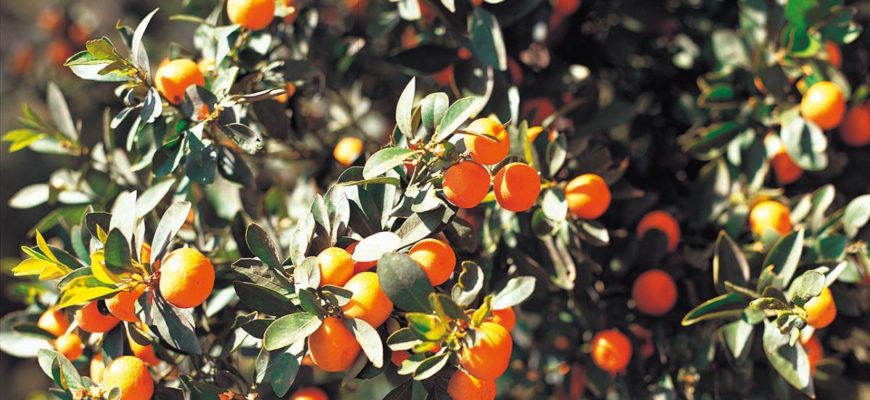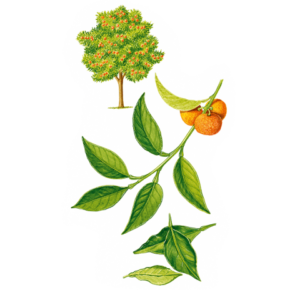
Find out more about the Petit grain bitter orange plant of our Aromatherapy Herbarium blog series.

PETIT GRAIN BITTER ORANGE
Citrus aurantium
ssp. amara (folia)
DESCRIPTION

Native to Asia, the bitter orange tree (Citrus aurantium ssp.amara (folia)) is a member of the Rutaceae family, with spiny branches and alternate, persistent and coriaceous brilliant green leaves.
ADVICE
Essential oil of bitter orange can be used to help children go to sleep. Avoid using it on the skin before exposure to the sun as it is phototoxic.
DO NOT USE IN
– pregnant or breast-feeding women,
– children under the age of three years,
– persons allergic to one of the components (geraniol, limonene, linalool),
– subjects with asthma without the advice of an allergologist before the first use.
RECIPES
Childhood nightmares (from the age of three years)
Massage 1 drop of essential oil of bitter orange and 1 drop of essential oil of true lavender, mixed with 2 drops of carrier oil, into the solar plexus and soles of the feet, before going to bed, for one week.
Nervous imbalance (children over the age of three years)
Place one drop of pure essential oil of bitter orange onto the inner surface of each of the child’s wrists and ask him/her to breathe deeply.
Devitalised skin
Add 1 drop of essential oil of bitter orange to a dose of day cream.
Greasy skin
3 drops of EO of cistus, 10 drops of EO of geranium, 10 drops of EO of bitter orange, 20 ml of jojoba CO. Apply the above mixture each morning.
Stress, anxiety
Mix 10 to 15 drops of essential oil of bitter orange in one teaspoon of powdered milk or neutral base. Pour this mixture into hot bath water (at least 37 °C).
Take 2 drops of essential oil of bitter orange on a neutral tablet, sugar cube, or in honey, three times daily.

It bears fruit called sour oranges, that are unfit for consumption, smaller than sweet oranges, with a thick rough peel and bitter and acidic flesh. Like several other oriental fruit trees, bitter orange was brought back by the soldiers of Alexander to their respective countries and, fifteen centuries later, reintroduced by the crusades to a Western world that had largely forgotten it. Its fruit, the bitter orange, was known to our ancestors long before it was cultivated. They justifiably praised its peel, that they used as a digestive tonic, serving it as an entrée to their copious feasts and protecting them from the consequences of over-indulgence. The Greek Theophrastus, founding father of botany thanks to his treatises Enquiry into plants and On the causes of plants, praised the virtues of this fruit as early as the 4th century BC. Six centuries later, Galienus, physician to the emperor Commodus, prescribed it for a great many ailments. In Chinese traditional medicine, it is used to treat digestive and cardiac disorders: zhi shi (unripe fruit) and zhi kiao (rind). Combining sweetness with bitterness, this exquisite and paradoxical fruit inevitably inspired poets. Thus, Aragon sang his “sombre amour d’orange amère” (dark lover for bitter orange).
CULTIVATION AND PRODUCTION
The “bitter” orange tree, introduced into Spain by the Arabs in the 9th century, also referred to as the “Seville orange tree”, is cultivated in many countries, including India, China and Paraguay. It is mainly used in the perfume industry, where it is a constituent of eau de Cologne.
FRAGRANCE
The odour of bitter orange is that of citrus: tangy, fresh and floral, with a pronounced note of orange.
EXTRACTION AND YIELD
Essential oil of bitter orange is obtained by distillation of the leaves, where as the so-called “bitter orange” essence, comes, as is the case for all citrus fruit, from cold expression of the rind. It takes one hundred kilograms of leaves to obtain seven hundred grams of essential oil, i.e. a yield of 0.7%.
CHEMICAL FORMULA
The main active constituents of essential oil of bitter orange are terpene esters (linalyl, geranyl and neryl acetates) and monoterpenols (alpha-terpenol, linalool).
MAIN INDICATIONS
A providence for stressed individuals, essential oil of bitter orange has a potent relaxing and sedative effect that sweeps away the blues and promotes restful sleep. It is of great use for calming hyperactive children. It corrects nervous imbalances, spasmophilia, breathing and heart rate disorders. An anti-spasmodic, it relieves cramps, stiff neck, colic and menstrual pains. It treats skin infections; moreover, it is an excellent cell regenerating agent that improves skin condition and regulates excessive perspiration.


Leave a Comment